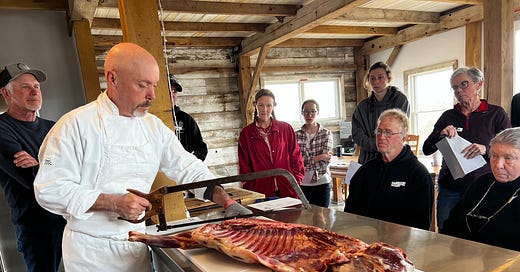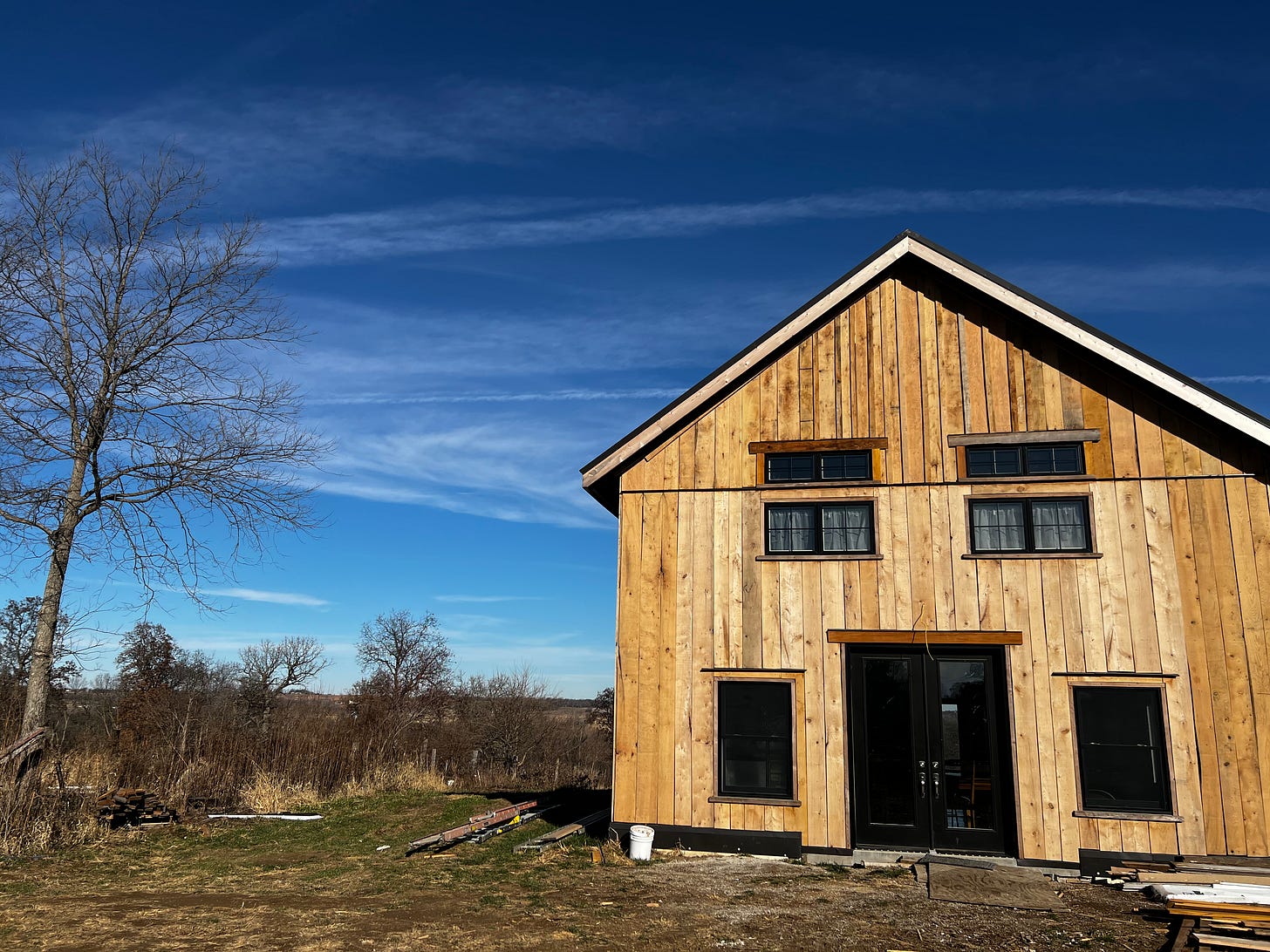Let’s start with the price: $7170. That’s the insurance quote I got this week from the only company that will insure us.
The only company.
Apparently “agritourism”—having tourists on your farm for classes or pizza night or to pet goat kids—is a no-no in Iowa now. And really, when you think about it, watching a cooking demo is pretty dangerous.
The cost of the premium on our cattle and goats is also extremely high. And yet, if we were trying to insure our corn or soybean crop, we would not only be able to find companies to cover us, the cost of our premiums would mostly be paid by you, the American taxpayer. More on that in a minute.
First, we tried to get coverage for our farm with our current company. When they told us they would not insure our new Barn House building we moved on to others, and got a “no, we are not doing that anymore” response from almost all.
All except Farm Bureau Financial Services, our last-ditch resort. We were reluctant to call them—we used to be members of the Iowa Farm Bureau and grew tired of the positions held by the group. They lobby hard for large-scale commodity crops (aka—corn and soybean), and often seem to have the interest of large corporations in mind more than that of smaller-scale farmers. And above all, we care about promoting a kind of farming that cares for the land in ways they do not (they have fought the Clean Water Act, for example).
But we called a FB agent.
A list of typical insurance questions came back to us. How many cows did we have? What were our farm receipts? Did we have employees? Then they threw this in:
“We [the Farm Bureau Financial Services] would need wording to be removed” from Whippoorwill Creek Farm’s “Home” page. It was the page that said:
Driving around Iowa is an eye-opener.
There it is, everywhere--corn and beans, corn and more corn. But this has left us with polluted waterways, high cancer rates and unhealthy foods for our kids.
That's why we are excited to do things differently, to bring you beef, goats and veggies without the sprays and chemicals, the GMO corn or soybeans.
Buying from Whippoorwill Creek Farm connects you to the things that matter: feeding our families delicious and nutritious food, creating jobs in our community and making sure Iowa's land is healthy for our great-great-great grandkids.
I responded to their request:
No thanks.
I had known the Farm Bureau was not friendly to differing opinions, but I didn’t think they would deny members from having them too.
Thanks for trying.
So the search for insurance continued. Finally, we found a new young Go-Getter Insurance Guy in a nearby town who came up with a different way of insuring us. That’s how we ended up with the whopping $7000+ insurance bill.
The quote is more than twice what we paid last year. Granted, the Go-Getter Insurance Guy seems much more engaged than our old agent and is likely actually getting us the coverage we need. And we do have a new, costly (and beautiful) building that is now up and running, where we are hosting classes and overnight farm stays.
But there are issues with the coverage too. It only covers the cattle if they are struck by lightning, fall into a frozen pond (en masse), are caught in a tornado, or are hit by hail, for example. They’re not covered if there is a flood that takes out the herd, or extreme heat or cold causes their end, each of which seems far more likely than lightning killing ten cows.
And in all cases, it would take many of them meeting their maker at the same time (all by the same cause) to make sense for us to file a claim. We will have a $2500 deductible, and the premium will likely increase as soon as we make a claim.
The broker also added that we could not be sure how much the company would pay to replace the herd if they indeed expired en masse. That’s up to them, not us.
It’s true, insurance is an American tradition. The first company in the United States began in 1735 in South Carolina; Ben Franklin formed one of the first companies to insure against fire in 1752. Today, the insurance industry collected $1.4 trillion in premiums (in 2021).
And insuring agricultural commodities is also not new. Federal crop insurance began during the Great Depression to insure that farmers would not go broke and lose the farm while trying to grow food to feed the rest of us.
But only those who grow the Golden Crops (a term I am making up)—corn, soybeans, cotton and wheat—typically gain access to that special kind of insurance, the federally backed kind. The kind heavily subsidized by the American tax payer, and supported by the aforementioned Farm Bureau.
The Government Accountability Office explains how crop insurance works:
USDA [US Department of Agriculture] partners with private insurance companies, which sell and service insurance policies to farmers. The federal government's crop insurance costs include (1) subsidies to pay for part of a farmer's crop insurance premium (over 60 percent in recent years) and (2) compensation to the insurance companies for selling and servicing crop insurance policies. [italics added].
Let me make sure you caught that taxpayers pay for BOTH the farmers’ premium AND compensation to the insurance companies. We pay the light blue portion of farmer’s insurance, costing us almost $10 billion a year from 2011 through 2021.
The Government Accountability Office (an independent, nonpartisan Agency that works for Congress) has made it clear in the past that this is an excessive cost to taxpayers.
We have previously suggested that Congress:
Reduce subsidies to high-income participants by creating an income limit
Adjust compensation to insurance companies to better align with market rates
As of February 2023, Congress hasn't acted on these matters. Savings from these changes could provide funding for other Farm Bill priorities.
Aligning with the market would likely mean that, like our insurance, covering your corn crop would be a more expensive endeavor. Perhaps then less corn would be insured, resulting in less people growing it. The continual creation of new ways to utilize the overproduction of corn—making it into plastics, ethanol, toothpaste or paint—could be eliminated. And maybe, just maybe, more farmers in Iowa might then raise foods we can actually eat.
Yet Republican lawmakers including Chuck Grassley and Joni Ernst are asking for increased support for crop insurance coverage—up to 85% of premiums, resulting in billions more going toward supporting the Golden Crops. Higher premium payments are also supported by the Soybean Growers, the Corn Growers, and you guessed it—the American Farm Bureau.
Let me be clear—I do not think the American public should subsidize the insurance of our cattle, or goats or our barn. I don’t really understand how anyone with a business would feel entitled to have 85% of their insurance premiums covered by our taxes. And I am unclear how those very same Republicans unwilling to fund our schools, our parks, science research, Medicare and Social Security, or to relieve student debt burden (a different kind of subsidy in our future) can justify such a huge expense being covered by the American people.
In the end, the Go Getter Insurance Guy has done the best he can, and we will have to bite the bullet and pay the premiums—all on our own.
Beth Hoffman is the author of Bet the Farm: The Dollars and Sense of Growing Food in America and farms with her husband John in south central Iowa. You can find information about their grass-finished beef, goats, classes, and farm stays on their website iowa-farm.com. She is part of the Iowa Writers’ Collaborative.








When I read this, it makes me admire what you do even more. You are facing so many odds, and yet, you persist! Bravo to you for continuing to fight the good fight.
Thanks for shedding light on this issue. My curiosity starts to wonder if the DSM insurance community, specifically on the innovation side could pop this up as a new line of business or startup. DSM is home to the Global Insurance Accelerator which seeds new Insurtech ideas. We should be solving problems like this in our own backyard...
Another thought is looking at the associations (PFI, IFU, even ISU) to advocate this to the ag brokers and carriers OR offer their own specialty insurance to members. Either way, more people need to hear this. Thanks for sharing.